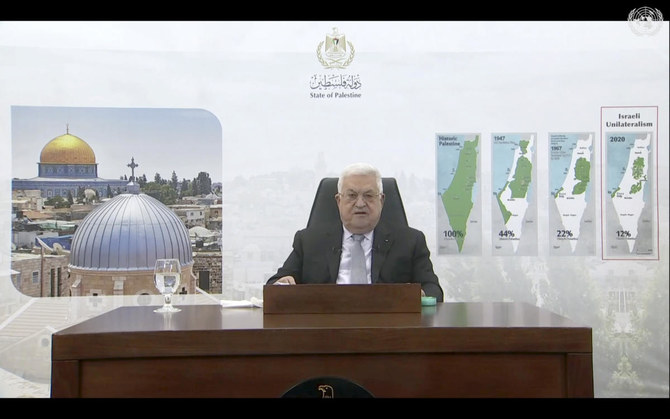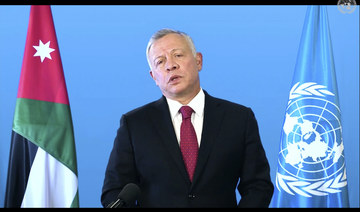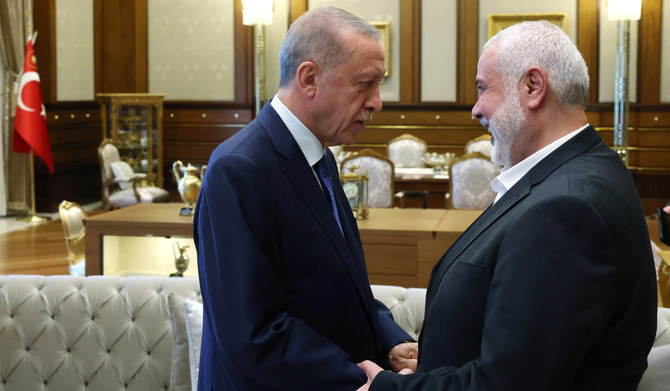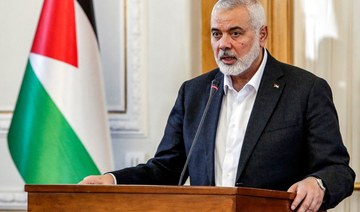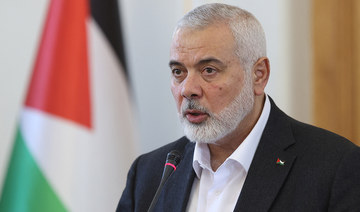WASHINGTON D.C.: Palestinian President Mahmoud Abbas has given the Israeli government one year to withdraw from the occupied territories of West Bank and Jerusalem or face the prospect of the Palestinians withdrawing their recognition of Israel.
Abbas said that the Palestinians would otherwise seek a legal judgment from the International Court of Justice against Israel’s occupation of the Palestinian territories.
The Palestinians stood ready to finalize the borders between the prospective Palestinian state and Israel and finish negotiations over other lingering final status issues such as the return of refugees and the status of occupied Jerusalem, he said.
Abbas, who delivered a prerecorded statement from Ramallah to the 76th session of the UN General Assembly in New York, said that the Palestinians had had enough of Israel’s 54-year occupation of Palestinian lands. He said after decades of peace negotiations with Israel, the Palestinians still had no Israeli peace partner interested in ending the conflict.
Israel occupied the West Bank, the Gaza Strip and East Jerusalem, where Palestinians hope to establish their state, during the 1967 war after defeating the armies of Jordan, Egypt and Syria.
Abbas said that the Palestinians had honored all their agreements with Israel and committed to a peaceful end to the conflict, especially after signing the Oslo accords between Israel and the Palestinians in 1993.
He said that Israel had not only not honored its agreements with the Palestinians, but undermined the prospect of a two-state solution by building illegal settlements to increase the Israeli-Jewish population in the occupied territories in violation of international law.
The Oslo accords stipulated the withdrawal of Israeli occupation forces from the West Bank and Gaza within several years of the agreement. It also committed Israel to negotiate the final status of occupied East Jerusalem, the establishment of a Palestinian state and the right of return of Palestinian refugees no later than one year after the final status negotiations that started in 1999.
Abbas said that Israel had since rejected and refused to implement all of the peace proposals and agreements it signed with the Palestinians, including the Oslo accord.
“Contrary to past agreements and to the principles of international law, Israel is forcing the Palestinians out of their homes in Jerusalem, especially the Sheikh Jarrah neighborhood,” he said. “Israel is committing ethnic cleansing of Palestinians and this is considered a crime according to international law.”
The Palestinian leader chastised the UN and members of the international community for not holding Israel accountable for its actions, which made it think of itself as a country above the law.
Abbas also criticized the US and European countries, without naming them, for recognizing the Israeli occupation and its system of “apartheid” while boasting that they shared “the same values with it.”
“What kind of shared values are they talking about?” he asked. Abbas praised the American administration of president Joe Biden, describing his ties with the US government as “constructive dialogue.”
He said that current talks with US envoys revolved around the American government guarantee of an Israeli commitment to enforce its signed agreements with the Palestinian government.
On the domestic front, Abbas said that he had not canceled the Palestinian legislative elections, which were due to take place last May, but rather “postponed” them. He said that he decided against holding the slated elections because Palestinians in Jerusalem would not be able to vote due to Israeli objections.
In an apparent criticism of his main Palestinian rival, Hamas, Abbas told the international community that the Palestine Liberation Organization, which he is chairman of, was the only representative of the Palestinian people.
Abbas, who is also the chairman of the Palestinian Authority that administers the Palestinian cities in the West Bank, has been the subject of criticism and protests by Palestinian citizens. In recent months, Palestinian protesters have demanded his resignation over claims of corruption, human rights violations and security collaboration with Israel.



